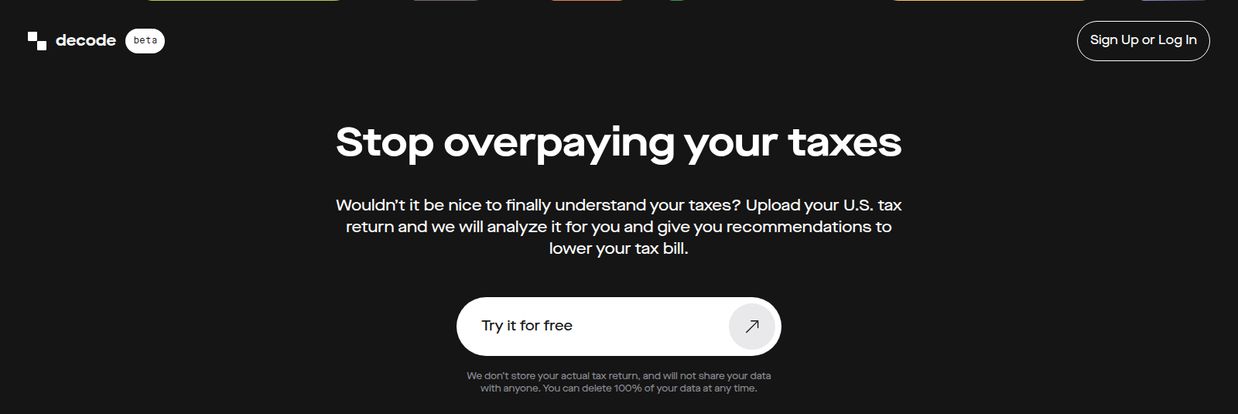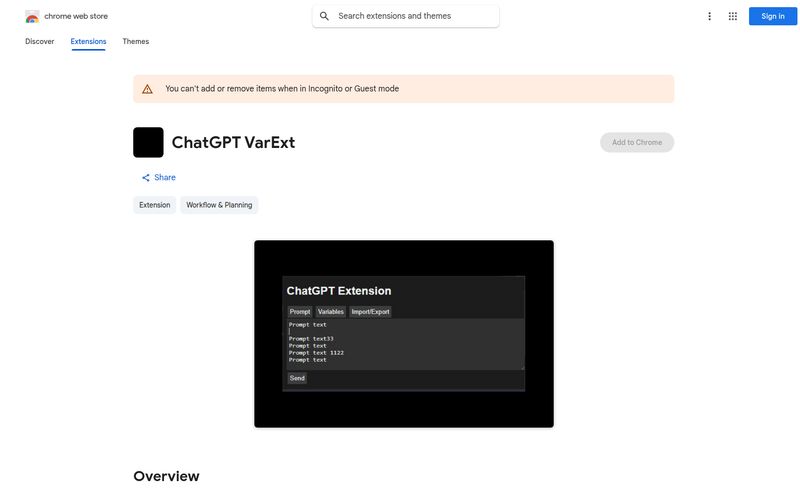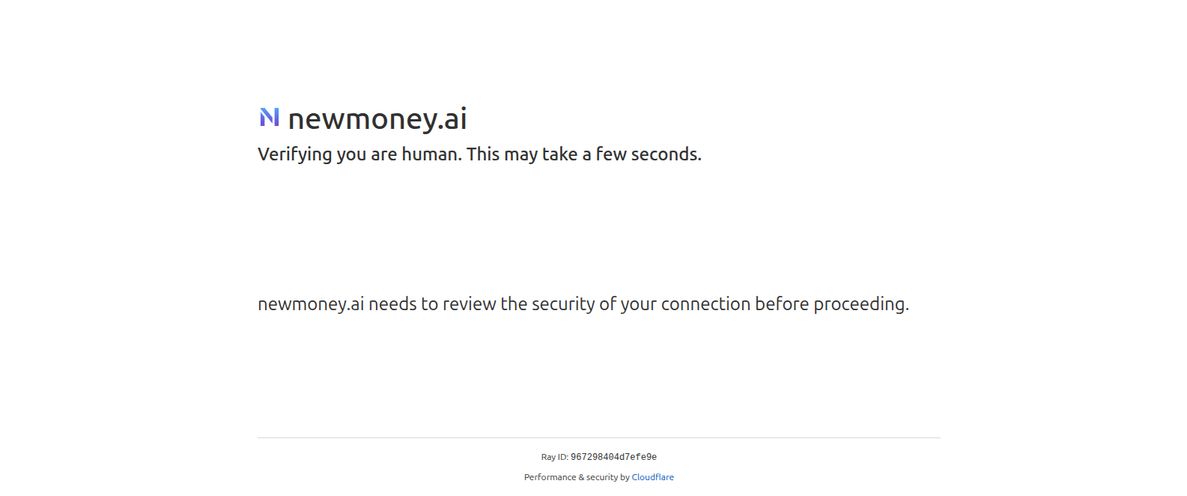Taxes. Ugh. The word alone is enough to induce a small, but significant, spike in my cortisol levels. Every year, millions of us dutifully plug numbers into software or hand a shoebox of receipts to a professional, cross our fingers, and hope for the best. We’re left with a lingering, nagging question: “Did I miss something? Am I leaving money on the table?”
It feels like you need a secret decoder ring to understand the labyrinthine U.S. tax code. For years, I’ve navigated the choppy waters of freelance income, business expenses, and quarterly payments. I’ve always wondered if there was a simpler way to get a “second look” without shelling out another few hundred bucks for a consultant’s time. I want someone to just... explain it to me. In plain English.
So, when I stumbled upon a tool called Decode.tax, my professional skepticism and personal curiosity were immediately piqued. The promise is bold and beautiful: “Stop overpaying your taxes.” It claims to analyze your tax return for free and give you personalized recommendations to lower your bill. Free? Personalized? Sounds too good to be true, right? Well, you know me. I had to kick the tires and see what was under the hood.
So, What Exactly is Decode.tax?
In the simplest terms, Decode.tax is a web-based tool that acts as a translator for your tax return. It's not tax prep software like TurboTax, and it’s not a human CPA (Certified Public Accountant). It sits somewhere in between. You feed it your completed tax return, and its AI-powered system scans through it, looking for potential savings, red flags, and areas for improvement.

Visit Decode.tax
Think of it like this: You’ve just finished building a piece of IKEA furniture. You’re pretty sure you followed the pictograms correctly, but there are two screws left over and the whole thing wobbles a bit. Decode.tax is like the friend who comes over, glances at your work and teh manual, and says, “Ah, I see what happened. That cam lock on page 3 should be turned the other way, and those leftover screws? They’re for mounting it to the wall so it doesn’t tip over.” It doesn’t rebuild it for you, but it gives you the actionable advice you need to fix it yourself.
How It Works: The 30,000-Foot View
The process is refreshingly straightforward, which I appreciate. There’s no clunky software to download or a 20-step setup process. You head to their website, sign up, and upload a PDF of your most recent U.S. tax return. That's pretty much it.
From there, the platform’s brain—let's call it the AI engine—gets to work. It parses the data from your Form 1040 and any associated schedules. Within a relatively short time, it generates a report. This report is the core of the service, highlighting what it found in a way that’s meant to be digestible for the average person, not just tax professionals. It’s a clean, simple user experience that doesn’t demand much from you, which is a major win in my book.
The Good Stuff: What I Liked About Decode.tax
I went into this with a healthy dose of skepticism, but I came away pleasantly surprised by a few things. First and foremost, it’s actually free. At least for now, while it's in beta. There were no pop-ups asking for a credit card, no “trial period” countdowns, no shady up-sells. In a world where “free” usually means “you are the product,” this was a refreshing start. They just want you to try it. I can respect that.
Another major plus is that the advice is personalized. It’s not just a generic checklist of common deductions you could find on any finance blog. It’s looking at your specific income, your deductions, and your credits to offer suggestions. It might point out that your home office deduction seems low for your profession, or suggest you look into specific tax credits based on your family situation. This tailored approach is infinitely more valuable than generic advice. It also does a fantastic job of simply demystifying your return. It can help you understand why your refund was what it was, or why you owed money. That educational component is something I believe is sorely needed.
But the feature that truly won my trust was the clear and prominent data policy. They state that you can delete 100% of your data at any time. This is huge. Giving users an easy-to-find “nuke it all” button shows a respect for privacy that, frankly, a lot of bigger tech companies could learn from.
The Not-So-Good Stuff: My Reservations
Okay, it's not all sunshine and tax refunds. My biggest critique is that the analysis can feel a bit like a black box. It gives you recommendations, which is great, but it doesn't always provide a deep dive into the how and why of its conclusions. As someone who likes to see the work, I was left wanting a little more detail on the scope of its analysis. What specific things is it not looking for? It's a new tool, and still in beta, so this might improve over time, but for now, you have to take some of its suggestions on faith.
My other concern is the classic tech problem: garbage in, garbage out. The tool analyzes the tax return you provide. If that return was prepared with incorrect or incomplete information to begin with, the AI’s recommendations will be based on a flawed foundation. It’s not a magic fact-checker that can tell if you forgot to report that freelance gig from last May. It can only work with what you give it. It's an analyzer, not an auditor.
Let’s Talk Security (Because We Have To)
I can hear you thinking it, because I was thinking it too: “Upload my entire tax return to a website I just heard of? Are you crazy?” The sensitivity of that document cannot be overstated. It has your Social Security number, your income, your address, your dependents—everything a scammer could ever dream of.
This is where Decode.tax has to earn your trust, and they seem to know it. Their privacy-first approach is their main defense. On their homepage, they explicitly state, “We don't store your actual tax return, and will not share your data with anyone.” The data deletion option I mentioned earlier is the real hero here. The ability to control and permanently erase your information gives back a measure of power that is often missing in online services. It’s a digital handshake, a promise that you’re in the driver's seat. Still, you have to be comfortable with that initial upload. For some, that might be a bridge too far, and that's a perfectly valid stance.
Who is Decode.tax Really For?
So who should be kicking these tires? In my opinion, the ideal user falls into a few categories.
First, there's the massive group of DIY tax filers. If you use services like FreeTaxUSA or TurboTax, running your completed return through Decode.tax could be an excellent, free way to get a second opinion and catch things you might have overlooked. It’s like having a friend proofread your essay before you hand it in.
Second, my people: freelancers, gig workers, and side-hustlers. Our tax situations can get messy fast, with multiple income streams and a dizzying array of potential business expenses. A tool like this could be brilliant for spotting missed deductions that are common for self-employed individuals. Think home office, mileage, software subscriptions, etc.
Finally, I think it’s great for the financially curious. If you just want to understand your own financial life better and learn the basics of how your tax bill is calculated, this is a fantastic educational resource that doesn’t come with a hefty price tag. It's not, however, a substitute for a CPA if you're running a multi-million dollar corporation with international subsidiaries. Let's keep it in perspective.
The Verdict: Is Decode.tax Worth Your Time?
My final take? Yes, I think it is. With a couple of important caveats.
As a free tool (for now), the risk is incredibly low and the potential upside is high. You might spend 10 minutes and discover a deduction that saves you hundreds of dollars. That’s a pretty good ROI. I see it as a powerful new type of tool in the taxpayer's arsenal.
However, it’s crucial to view Decode.tax as a helpful, AI-powered sidekick, not a full replacement for a human tax professional. A good CPA does more than just fill out forms; they understand your life goals, your business strategy, and can offer proactive advice for the future. Decode.tax is reactive; it looks at what you've already done. Use it as a starting point. Let it find potential issues or opportunities, and then use that information to ask smarter questions, whether you're asking yourself or asking a professional. It's a tool for empowerment, and I'm always on board with that.
Frequently Asked Questions (FAQ)
Is Decode.tax safe to use?
It appears to be designed with security in mind. They state they don't store your actual tax return file and have a clear policy allowing you to delete all of your associated data at any time. However, like with any online service that handles sensitive information, users should assess their own comfort level before uploading documents.
What kind of tax documents can I upload?
The service is designed to analyze your main U.S. tax return, which is typically a PDF of your completed Form 1040 and its common schedules. It's meant to review the return after you've prepared it.
Will Decode.tax file my taxes for me?
No. Decode.tax is an analysis and recommendation tool, not a tax preparation or filing service. Its purpose is to help you understand your completed return and find potential savings you can apply in the future or through an amended return.
How does Decode.tax make money if it's free?
Since the tool is currently in a public beta, it's likely focused on user acquisition and product refinement. It's a common strategy for tech startups. In the future, they might introduce premium tiers with more advanced features or offer adjacent financial products, but for now, the core analysis service is free.
Is this a replacement for a human CPA?
Definitely not. It's a fantastic tool for getting a second look or for simpler returns, but it can't replace the nuanced, forward-looking, and strategic advice of an experienced Certified Public Accountant, especially for complex financial situations.
What happens to my data after the analysis?
According to their policy, they do not store the uploaded tax return file itself. The system extracts the necessary data for analysis. Most importantly, they provide an option for you to delete 100% of your data from their systems at any time.
A Step in the Right Direction
At the end of the day, anything that helps ordinary people feel more confident and in control of their finances is a win in my book. Decode.tax is an ambitious and promising platform that tackles a real, universal pain point. The fact that it's free and prioritizes user privacy makes it a compelling option for anyone who has ever looked at their tax forms and felt completely and utterly lost. It's not magic, but it's a darn good translator, and sometimes, that’s exactly what you need.
Reference and Sources
- Decode.tax Official Website
- IRS Information on Credits & Deductions
- TechCrunch article on AI in the tax space (for context on the industry trend)



